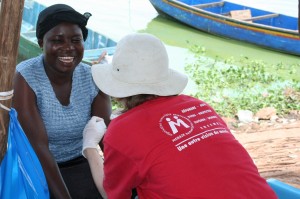
A woman gives blood during a voluntary counseling and testing (VCT) outreach provided by Hope Clinic Lukuli in Ggaba, Uganda. Ggaba is a fishing village in Kampala with a high HIV rate. © 2008 Alexandria Smith, Courtesy of Photoshare
The use of progestogen-only injectable contraception, particularly DMPA, has been linked in some studies, but not others, to an increased risk of HIV acquisition and increased transmission to male partners. In response, WHO continues to recommend no restriction on the use of any hormonal contraceptive method for women living with HIV or at high risk of HIV, but also recommends that “women using progestogen-only injectable contraception should be strongly advised to also always use condoms, male or female, and take other HIV preventive measures.”
Because the evidence is inconclusive, conveying the uncertainty associated with current research and WHO recommendations is challenging. It requires clear communication that engages women, their partners and their communities in active and accurate discussions of sexual health, rights and norms.
To this end, CCP drafted the Strategic Communication Framework for Hormonal Contraception and Potential Risk of HIV Acquisition and Transmission with technical assistance and guidance from WHO and USAID. This guidance outlines key messages and activities for a variety of audiences that may be adapted for use at the country level. This adaptable strategy is not designed as a “one size fits all” model, but rather as a basic foundation that can be adapted and expanded upon by countries to create national or subnational communication strategies tailored to the local context.
The Framework was finalized in January 2016 and updated in May 2017 based on new guidance from WHO.
Malawi and Swaziland have successfully adapted the Framework to develop their own communication strategies. In October 2015, a regional meeting with representatives from Nigeria, Kenya, Uganda, Zambia, Swaziland, Lesotho, South Africa, Malawi, Tanzania and Mozambique was held to introduce the framework and discuss how it could be adapted it to their country contexts.
Presentations from the October 2015 Regional Meeting:
- Hormonal Contraception and HIV Acquisition: Getting on the “Same Page”
- Evidence on Hormonal Contraception & ART Interactions
- Strategic Communication Framework for Hormonal Contraceptive Methods and Potential HIV-Related Risks
- Adaptation of Hormonal Contraceptive and HIV Communication Strategy in Malawi
- Adapting the Framework: Swaziland’s Experience

